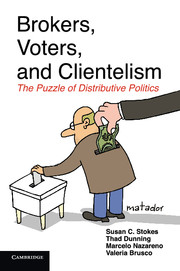Book contents
- Frontmatter
- Dedication
- Contents
- List of Tables
- List of Figures
- Preface and Acknowledgments
- I MODALITIES OF DISTRIBUTIVE POLITICS
- II THE MICRO-LOGIC OF CLIENTELISM
- 2 Gaps Between Theory and Fact
- 3 A Theory of Broker-Mediated Distribution
- 4 Testing the Theory of Broker-Mediated Distribution
- 5 A Disjunction Between the Strategies of Leaders and Brokers?
- 6 Clientelism and Poverty
- III THE MACRO-LOGIC OF VOTE BUYING: WHAT EXPLAINS THE RISE AND DECLINE OF POLITICAL MACHINES?
- IV CLIENTELISM AND DEMOCRATIC THEORY
- Appendix A: Argentina Brokers' Survey
- Appendix B: Argentina Voters' Surveys
- Appendix C: Venezuela Voters' Survey and the Maisanta Database
- Appendix D: India Voters' Survey
- References
- Index
- Miscellaneous Endmatter
5 - A Disjunction Between the Strategies of Leaders and Brokers?
Published online by Cambridge University Press: 05 June 2014
- Frontmatter
- Dedication
- Contents
- List of Tables
- List of Figures
- Preface and Acknowledgments
- I MODALITIES OF DISTRIBUTIVE POLITICS
- II THE MICRO-LOGIC OF CLIENTELISM
- 2 Gaps Between Theory and Fact
- 3 A Theory of Broker-Mediated Distribution
- 4 Testing the Theory of Broker-Mediated Distribution
- 5 A Disjunction Between the Strategies of Leaders and Brokers?
- 6 Clientelism and Poverty
- III THE MACRO-LOGIC OF VOTE BUYING: WHAT EXPLAINS THE RISE AND DECLINE OF POLITICAL MACHINES?
- IV CLIENTELISM AND DEMOCRATIC THEORY
- Appendix A: Argentina Brokers' Survey
- Appendix B: Argentina Voters' Surveys
- Appendix C: Venezuela Voters' Survey and the Maisanta Database
- Appendix D: India Voters' Survey
- References
- Index
- Miscellaneous Endmatter
Summary
At the end of the last chapter, we noted that if our broker-mediated theory is accurate, people at distinct rungs in the party ladder will hold predictably different preferences over which types of voters should receive material rewards. Party leaders should favor distributing resources to responsive voters; other things (than voter partisanship) being equal, they prefer that party resources end up in the pockets of uncommitted voters. Brokers have greater incentives to target loyal partisans, though – as we have seen, both theoretically and empirically – they also expend some resources on swing voters. In this chapter we test this same hypothesis, but now at extremes of the party hierarchy. We use evidence of distribution of benefits among states, provinces, municipalities, and electoral districts. Such intergovernmental transfers should reflect the distributive preferences of elite partisan actors.
Evaluating the implications of the theory with real-world evidence is not a simple task. Many forces are at work in the distributive strategies of party leaders. Even in our theory, party leaders under some circumstances share with brokers an incentive to distribute to loyal supporters – for instance, when they are incumbents trying to buy back support after bad outcomes (large negative δ, in our model). Even if our model accurately captures the incentives brokers have to work against the interests of party leaders, the leaders are also likely to be subject to countervailing pressures. They may find themselves tacking back and forth between pleasing core supporters – to encourage high turnout or discourage potential competitors who might poach their constituents – and courting independents.
- Type
- Chapter
- Information
- Brokers, Voters, and ClientelismThe Puzzle of Distributive Politics, pp. 130 - 151Publisher: Cambridge University PressPrint publication year: 2013



